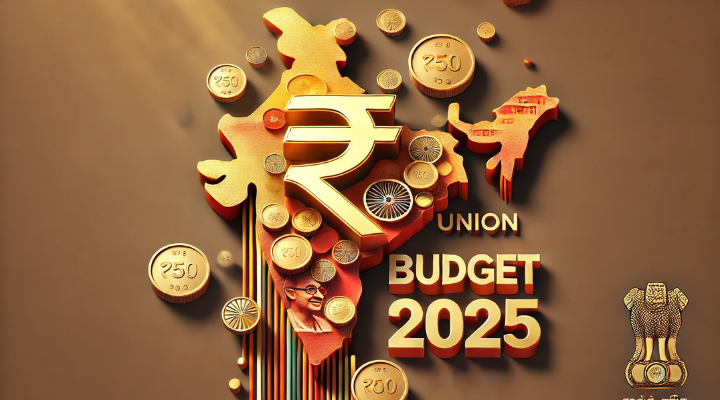Union Budget 2025 has generated immense interest across the nation, influencing individuals, businesses, and investors. Every year, budget announcements shape taxation policies, economic strategies, and the financial trajectory of various sectors. Finance Minister Nirmala Sitharaman is set to present the budget on February 1, 2025, with expectations of substantial reforms aimed at accelerating growth, employment, and infrastructure development.
This comprehensive guide covers key announcements, expected tax changes, and the sector-wise impact of Union Budget 2025.
Key Announcements in Union Budget 2025
1. Economic Growth and Employment Generation
India faces challenges such as inflation, global trade uncertainties, and economic slowdown. The government is likely to implement measures that boost domestic consumption, job creation, and investment inflows.
- Revised Personal Income Tax Slabs: A potential restructuring of tax slabs could increase disposable income for the middle class, enhancing spending power and economic circulation.
- New Employment Schemes: Initiatives in manufacturing, technology, and services may create fresh job opportunities.
- Support for Startups & MSMEs: Easier credit access and lower tax burdens for small businesses may foster entrepreneurship and innovation.
(Source: Reuters)
2. Infrastructure Development and Capital Expenditure
Infrastructure investment is crucial for economic expansion. The government is expected to continue its focus on large-scale projects.
- Transport and Logistics: More funds will likely be allocated for roadways, railway expansion, and logistics hubs.
- Renewable Energy Push: Increased spending on solar, wind, and green hydrogen projects to meet sustainability goals.
- Urban Development: Investments in smart cities, metro expansions, and digital connectivity to improve urban living standards.
(Source: LiveMint)
3. Agriculture and Rural Development
More than 50% of India’s population relies on agriculture. Enhancing productivity and financial security for farmers remains a priority.
- Revised MSP Policies: Adjustments in the Minimum Support Price to ensure stable farmer incomes.
- Agriculture Infrastructure Fund: Expansion of storage facilities and food processing units.
- Loan Waivers & Interest Subsidies: Targeted financial relief for small farmers and agri-tech innovations.
(Source: Reuters)
4. Taxation Policies: Changes in Income Tax & Corporate Tax
Personal Income Tax Reforms
- Higher Tax Exemption Limits: The government may revise tax slabs to ease the financial burden on individuals.
- Expanded Deductions: Increased benefits under Section 80C for savings and insurance investments.
- Digital Payment Incentives: Tax benefits for businesses and individuals promoting cashless transactions.
Corporate Tax Adjustments
- Lower Corporate Tax Rates: Expected to attract foreign investment and boost domestic manufacturing.
- R&D Incentives: Increased deductions for technology, AI, and biotech research.
- Eased Compliance for MSMEs: Simplified tax regulations for small businesses to encourage growth.
(Source: Deccan Herald)
Sector-Wise Impact of Union Budget 2025
1. Real Estate and Housing
- Affordable Housing Initiatives: Expansion of low-cost housing projects.
- Home Loan Interest Relief: Increased deductions to make homeownership more accessible.
- Relaxed Tax Norms: Easier compliance measures for real estate investors.
(Source: Economic Times)
2. Manufacturing & ‘Make in India’
- Concessional Tax Rates: Incentives to boost domestic manufacturing.
- PLI Expansion: Production-linked incentives for semiconductor and EV industries.
(Source: Reuters)
3. Healthcare and Pharmaceuticals
- Higher Public Health Expenditure: Upgrading district hospitals and medical facilities.
- Tax Deductions for Health Insurance: Encouraging more individuals to opt for coverage.
- Investment in Medical Research: Support for pharmaceutical R&D to enhance domestic capabilities.
(Source: LiveMint)
Fiscal Deficit and Borrowing
The government aims to keep the fiscal deficit below 4.9%, balancing economic growth with prudent financial management. Controlled borrowing is essential to maintain investor confidence and economic stability.
(Source: Reuters)
Frequently Asked Questions (FAQs) About Union Budget 2025
1. What is the Union Budget?
The Union Budget is an annual financial statement detailing government revenue and expenditure.
2. When will Union Budget 2025 be presented?
Finance Minister Nirmala Sitharaman will present it on February 1, 2025.
3. Will tax slabs change in Budget 2025?
While speculations suggest revisions, exact details will be disclosed on budget day.
Conclusion
Union Budget 2025 is expected to introduce key reforms aimed at stimulating growth, enhancing infrastructure, and supporting various sectors. Whether it’s tax benefits for individuals, incentives for startups, or strategic investments in agriculture and real estate, this budget could play a crucial role in shaping India’s economic future.


